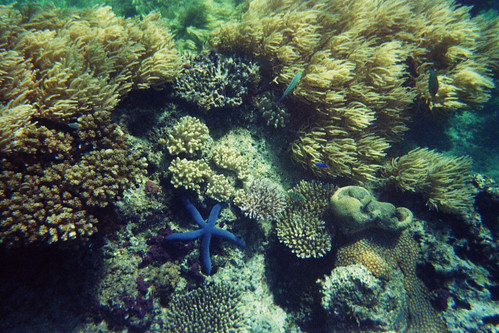![]()
 A new study published online in Current Biology has analyzed the results from over 48 population studies in the Caribbean from 1955 - 2007, and the results aren't pretty. Caribbean fish have been declining in a big way for at least the past decade, and the culprit isn't commercial fishing.
A new study published online in Current Biology has analyzed the results from over 48 population studies in the Caribbean from 1955 - 2007, and the results aren't pretty. Caribbean fish have been declining in a big way for at least the past decade, and the culprit isn't commercial fishing.
The study used meta analysis to look for trends across trophic groups, locations, fishing status, and overall density at over 300 different reefs. What they found wasn't good. Not only are species falling from fishing pressures, species which aren't commercially fished are losing numbers, too, suggesting that habitat degradation is the main cause behind the decreasing populations.
 Overall, reef fish density has been declining significantly for more than a decade, at rates ranging from 2.7% to 6.0% loss per year. This trend is across all subregions of the Caribbean basin and in three of six trophic groups. The authors suggest that dramatic drops in coral cover and recent changes in habitats are fueling this massive decline. As herbivores drop out of the population, algae takes over areas once covered with coral. Since the 1970s, there has been an 80% decline in coral cover in the Caribbean. Fishing might be partly to blame, as some commercial species are algae-eating herbivores.
Overall, reef fish density has been declining significantly for more than a decade, at rates ranging from 2.7% to 6.0% loss per year. This trend is across all subregions of the Caribbean basin and in three of six trophic groups. The authors suggest that dramatic drops in coral cover and recent changes in habitats are fueling this massive decline. As herbivores drop out of the population, algae takes over areas once covered with coral. Since the 1970s, there has been an 80% decline in coral cover in the Caribbean. Fishing might be partly to blame, as some commercial species are algae-eating herbivores.
 After all, we can look at other studies to see how much damage our activities are doing to the fish populations. Just look at the size of fish: a study published in Conservation Biology looked at photos of fish catches to show how dramatically the size of fish off of Key West has dropped since the 1950s. The three images are Trophy fish caught on Key West charter boats in a) 1957, b) early 1980s and c) 2007. So is it any wonder that the populations are in decline?
After all, we can look at other studies to see how much damage our activities are doing to the fish populations. Just look at the size of fish: a study published in Conservation Biology looked at photos of fish catches to show how dramatically the size of fish off of Key West has dropped since the 1950s. The three images are Trophy fish caught on Key West charter boats in a) 1957, b) early 1980s and c) 2007. So is it any wonder that the populations are in decline?
One of the authors, Michelle Paddack, had this to say regarding the strong results of the meta analysis:
"If we want to have coral reefs in our future, we must ensure that we reduce damage to these ecosystems," she said. "On a personal level, this may mean not buying wild-caught aquarium fish and corals, not eating reef fish species that are declining, taking care not to anchor on reefs, and reducing our carbon emissions to help control climate change. But importantly, we need to let lawmakers and resource managers know that we care about these ecosystems and we need to push for changes in how they are managed." (from EurkeAlert)
Stepping forward, taking control of our own actions, and being responsible is the only way that species like these have a shot.
Paddack, M., Reynolds, J., Aguilar, C., Appeldoorn, R., Beets, J., Burkett, E., Chittaro, P., Clarke, K., Esteves, R., & Fonseca, A. (2009). Recent Region-wide Declines in Caribbean Reef Fish Abundance Current Biology, 19 (7), 590-595 DOI: 10.1016/j.cub.2009.02.041
